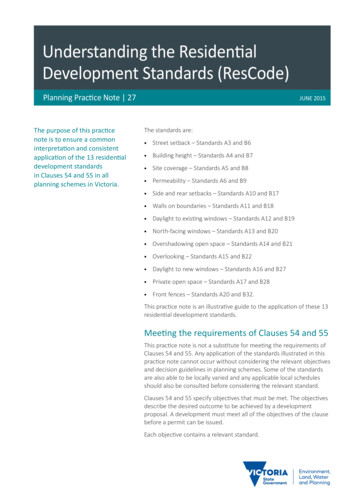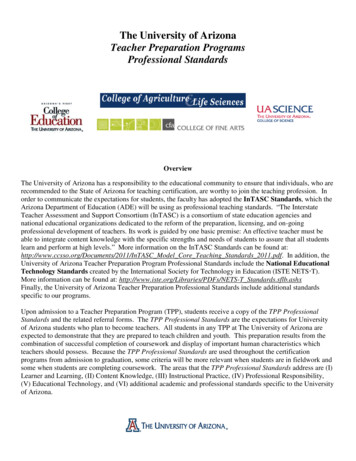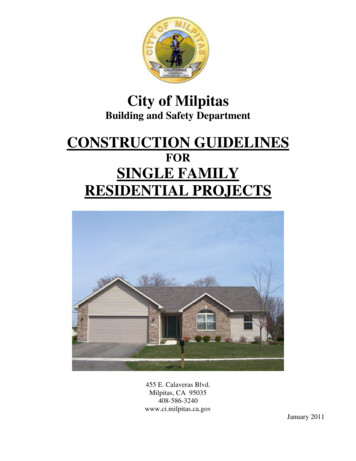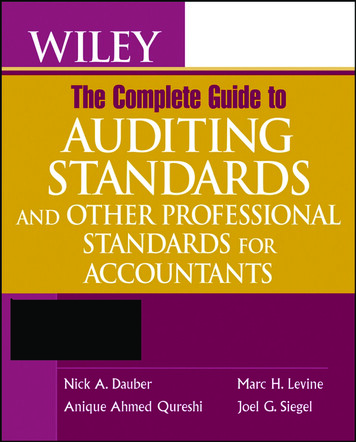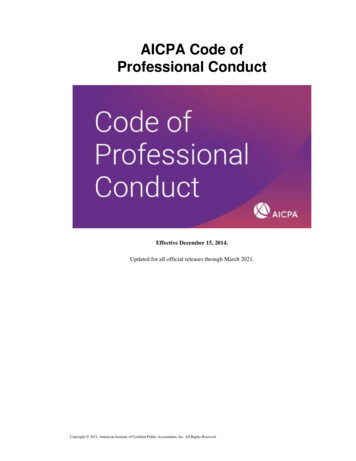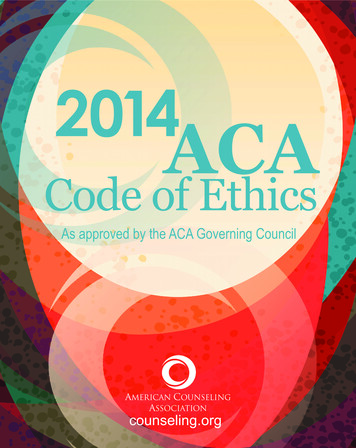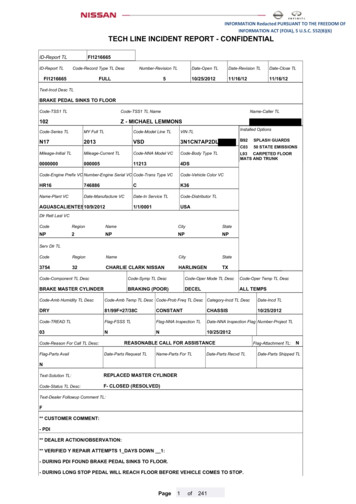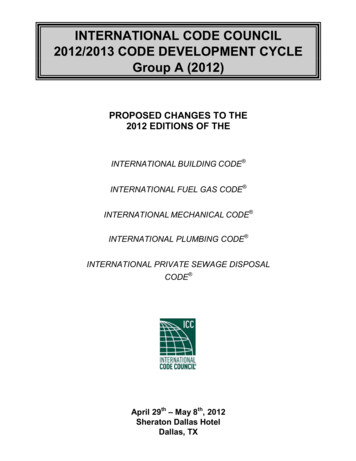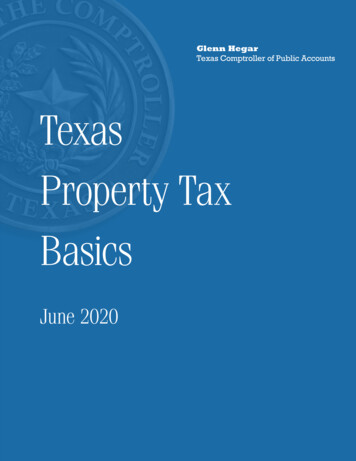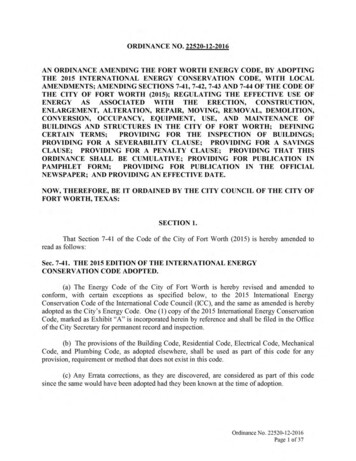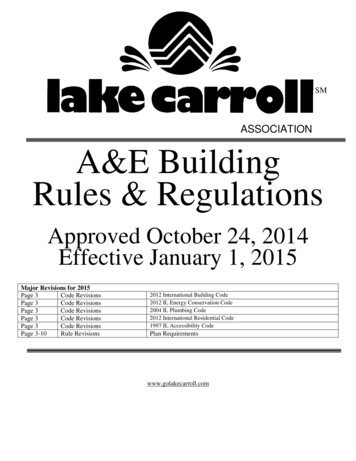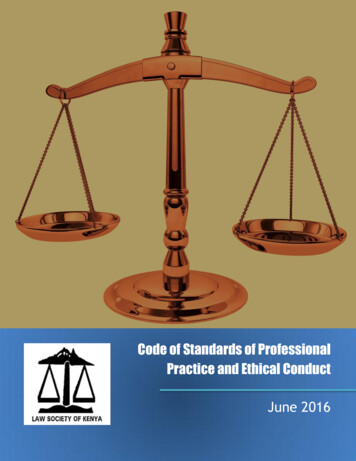
Transcription
Code of Standards of ProfessionalPractice and Ethical ConductJune 2016
Law Society of KenyaLavington, Opposite Valley Arcade, Gitanga RoadP.O Box 72219-00200NairobiTel: 254 20 2625391, 254 20 8155295,Mobile: 254 720 904 983, 254 704 442154, 254 704 442166Code of Standards of Professional Practiceand Ethical ConductJune 2016
Table of ContentsPART I. INTRODUCTION . 2A. Background. 2B. Application of the Code . 5C. Defining “Professional Misconduct” . 6D. Effectiveness of the Code . 8E. Arrangement of the Code . 9PART II: OVERRIDING VALUES AND PRINCIPLES OF PROFESSIONAL PRACTICE AND ETHICALCONDUCT. 10PART III: THE STANDARDS OF PROFESSIONAL PRACTICE AND ETHICAL CONDUCT . 13PART IV: GUIDANCE ON THE INTERPRETATION OF THE STANDARDS . 161.Requirement for a practicing certificate . 162.Advertising and/or marketing . 203.Competence and diligence in handling of a client’s brief: . 234.Professional Fees . 305.Client’s property . 366.Conflict of interest: . 417.Confidentiality of Advocate-client communication: . 448.The Advocate as client’s representative . 499.Professional undertakings: . 5310. The Advocate’s use of Social Media . 5511. The Advocate’s outside interests . 5712. Honesty and integrity: . 60PART V: REFERENCES . 63Law Society of Kenya Code of Standards of Professional Practice and Ethical Conduct, June 20161
PART I. INTRODUCTIONA. Background1.As in many other jurisdictions the legal profession in Kenya is governed undera regulatory framework comprising statutory provisions, various statutoryinstruments and guidelines issued by the Law Society of Kenya as theregulatory body. This regulatory framework is underpinned by theAdvocates Act, Chapter 16 as well as the Law Society of Kenya Act, Chapter18 of the Laws of Kenya.2.The regulatory framework also comprises a “Digest of Professional Conductand Etiquette” issued by the Law Society of Kenya in 2000 but, in the wordsof the Digest, “it was not an exhaustive treatise” and given that over 15years have passed since its issue, it is in need of updating to incorporatepresent day regulatory concerns and trends in the practice of law.3.Consequently, not only is the regulatory framework far from comprehensive,aspects of it are out of date as the various components have not beenrevised and updated. It is also not particularly coherent and many of its rulesand guidelines lack clarity, a feature which undermines compliance andmakes enforcement difficult. Furthermore, the framework does not extend toall aspects of the practice of law. Of particular concern is the fact that itdoes not address the management and administration of a law practice,client care and the relationship between the legal practitioner and the bodiesregulating the practice of law.4.The Law Society of Kenya (LSK) is the principal regulatory authority over thelegal profession. Its functions and powers are set out in sections 4 and 5 ofLaw Society of Kenya Code of Standards of Professional Practice and Ethical Conduct, June 20162
the Law Society of Kenya Act provides that the functions and objects of theSociety are, inter alia, to:(a) Ensure that all persons who practice law or provide legal services inKenya meet the standards of learning, professional competence andprofessional conduct that are appropriate to the services they provide;(b) Set, maintain and continuously improve the standards of learning,professional competence and professional conduct for the provision oflegal services in Kenya;(c) Determine, maintain and enhance the standards of professionalpractice and ethical conduct and learning for the legal profession inKenya;(d) Facilitate the realization of a transformed legal profession that iscohesive, accountable, efficient and independent; and(e) Protect and promote the interests of consumers of legal services andthe public interest generally, by providing a fair, effective, efficientand transparent procedure for the resolution of complaints againstlegal practitioners.5.Section 5 deals with the general powers of the Society and states that theSociety shall have the powers to do all things necessary for the proper andeffective achievement of its objects and the performance of its functions.6.Thus, as is the case with other professions locally and abroad, the legalprofession is substantially self-regulated.In its Strategic Plan for 2012-2016, LSK recognized the need to formulate a comprehensive code ofstandards of professional practice and ethical conduct. Building on theexisting Digest of Professional Conduct and Etiquette, the revised code wouldset standards for the legal profession and be the authoritative guide to legalLaw Society of Kenya Code of Standards of Professional Practice and Ethical Conduct, June 20163
practitioners, regulators and the public in determining what is expected of amember of the legal profession and judging professional misconduct.7.The Council of the Law Society of Kenya has therefore determined thestandards to apply to members of the LSK and approved this Code ofstandards of standards of professional practice and ethical conduct as aprincipal instrument of self-regulation of members. It articulates principles,sets standards and provides guidance on the standards of professionalpractice and ethical conduct expected of members of the Society.Law Society of Kenya Code of Standards of Professional Practice and Ethical Conduct, June 20164
B. Application of the Code8.The scope of LSK’s regulatory mandate is over its members. Section 7 of theLaw Society of Kenya Act defines the categories of members of the Society.This consists of:(a) Any person who has been admitted as an advocate and whose namehas been entered into Roll of Advocates kept under section 16 of theAdvocates Act (Cap 16);(b) Any person admitted to membership under section 8 of the Act; and(c) Any person elected as an honorary member of the Society undersection 9 of the Act.9.The Advocates Act, Chapter 16 defines an advocate to mean any personwhose name is duly entered upon the Roll of Advocates. Section 9 whichdeals with qualification for practicing as an Advocate states that no personshall be qualified to act as an Advocate unless:(a) He has been admitted as an Advocate;(b) His name is for the time being on the Roll; and(c) He has in force a practicing certificate.10. The Advocates Act therefore draws a distinction between persons who areAdvocates by virtue of the fact that the person’s name has been enteredupon the Roll of Advocates and persons who qualify to practice asAdvocates, the main distinction being that the latter category are personswho have in force a practicing certificate. The certificate is issued annuallyand lapses at the end of the calendar year in respect to which it was issued.Law Society of Kenya Code of Standards of Professional Practice and Ethical Conduct, June 20165
11. This Code of Ethics and Conduct is intended to apply to all members of theSociety, in this case all persons who fall within the provisions of section 7 ofthe Law Society of Kenya Act. Thus the Code is intended to guide practisingAdvocates, in-house counsel and others who, while not actively engaged inthe practice, are members of the Law Society.C. Defining “Professional Misconduct”12. The term “professional misconduct” is a widely used term in the context of thelegal profession. Section 60(1) of the Advocates Act Chapter 16 states that“the expression professional misconduct includes disgraceful or dishonourableconduct incompatible with the status of an Advocate.” The concept ofprofessional misconduct is wide and the categories of behavior that would beconsidered as amounting to misconduct not closed.13. Broadly speaking professional misconduct is conduct in breach of the rules,standards and ethics of the profession. The concept of professionalmisconduct therefore defines the standard of professional practice andethical conduct expected of a member of the legal profession. In regard tothe legal profession in Kenya the rules and standards governing the behaviorof Advocates are found in different texts, including the Advocates Act (whichdeals with admission and discipline), the rules made under it and standardsand guidelines issued by the Law Society.14. Professional misconduct is to be distinguished from “unsatisfactoryprofessional conduct.” The latter refers to conduct which falls below thestandard of conduct or behavior that is expected of a practicing Advocate,particularly when rendering legal services. It is conduct which falls below thestandard one may reasonably expect of a practicing Advocate in terms ofLaw Society of Kenya Code of Standards of Professional Practice and Ethical Conduct, June 20166
competence or unbecoming behavior (i.e. behavior not becoming of anAdvocate but occurring outside of the context of legal practice).15. Whereas the categories of professional misconduct are not closed there is aneed to provide a comprehensive way of deciding what in a particularinstance will be treated as “professional misconduct” or unsatisfactoryprofessional conduct. This is the task of the Code which sets out the keystandards that govern the conduct of a member of the Society. Guidance onthe interpretation of the standards is equally necessary. Such guidance aidsin compliance by members of the Society and in enforcement.16. This Code of Standards of Professional Practice and Ethical Conduct isintended to be the authoritative standard, guide and reference point inconstruing professional misconduct and unsatisfactory professional conduct. Itdefines the minimum standards designed to assist the regulatory bodies andthe legal practitioner alike in determining whether, in a particular case, theconduct in question falls within or outside of the remit of professionalmisconduct.17. The Code however does no more than set minimum benchmarks forprofessional practice and ethical conduct, the breach of which amounts tomisconduct and might attract punishment. It is not the last word on the conductexpected of a member of the Society. In addition to regulating misconductthe role of LSK as the regulatory body is to encourage professionalism in thelegal profession.18. An aspiration to professionalism seeks to encourage within the legalprofession conduct that preserves and strengthens the dignity, honour andLaw Society of Kenya Code of Standards of Professional Practice and Ethical Conduct, June 20167
ethics of the profession. Professionalism goes beyond avoidance ofmisconduct. It extends to matters of good professional practice, etiquette andethics, the breach of which do not amount to professional misconduct. Amember of the Society is expected to aspire to higher standards ofprofessional practice and ethical conduct, going beyond mere avoidance ofmisconduct. At this higher level the legal professional is to be guided byhis/her conscience, ethical beliefs and the overriding principles and valuesapplicable to legal professionals the world over.19. Typically the rules governing professional conduct are set within theframework of overriding principles, ethics and values which ought to guideand underpin the interpretation and understanding to be accorded to specificrules in specific contexts. The principles apply to members of the LSK whenproviding legal services and, in certain cases, even when not providing legalservices.D. Effectiveness of the Code20. Under Part XI of the Advocates Act, the Code may, pursuant to the provisionsof section 55, be enforced against an Advocate by the Society. The Codemay also be enforced by the Advocates’ Complaints Commission establishedby section 53 of the Advocates Act. The Chief Justice or a judge of the HighCourt may also, in exercising disciplinary powers over Advocates undersection 56 of the Act, resort to the Code. Its enforcement lies mainly in afinding, by the regulatory bodies, that by failing to comply with theprovisions of the Code, an Advocate is guilty of professional misconduct.21. The Code outlines principles, standards and guidance for members of theLaw Society of Kenya. The standards have been benchmarked againstinternational practice and practice in other commonwealth jurisdictions. TheyLaw Society of Kenya Code of Standards of Professional Practice and Ethical Conduct, June 20168
do not replace but supplement existing obligations under applicable lawsand serve as a framework and a guide for decision-making and action inspecific contexts.22. The effectiveness of the Code will depend on the extent of belief in, andadherence to, the principles and values outlined in Part II, the individual legalprofessional’s conscience and integrity; an ethical culture within the legalprofession; and robust interpretation and enforcement by the profession’sregulatory bodies.E. Arrangement of the Code23. The Code comprises this introductory section which gives the background andsets the context; a section on the overriding values and principles ofprofessional conduct which provides the framework within which the provisionsof the Code are to be interpreted; a section on the standards and a sectionwhich provides guidance on the interpretation of the standards.24. Whereas the Code aims to provide a comprehensive set of principles,standards and guidance for interpreting the standards circumstances willarise in which the professional does not find adequate guidance within thisCode to enable him or her adequately deal with a particular situation orevent. Therefore Advocates are advised to seek the guidance of the LawSociety when faced with an issue which they do not find a ready answer towithin the Code.Law Society of Kenya Code of Standards of Professional Practice and Ethical Conduct, June 20169
PART II: OVERRIDING VALUES AND PRINCIPLES OF PROFESSIONAL PRACTICEAND ETHICAL CONDUCT25. The standards of professional conduct and ethics set out in the Code areunderpinned by the following ten (10) principles, which are seen universallyapplicable to the practice of law and ideals that ought to govern the conductof members of the legal profession worldwide. The principles and valuesought to infuse the decisions and actions of any member of the legalprofession as well as those of regulatory authorities when construing theactions of its member who is facing a charge of professional misconduct.OVERRIDING PRINCIPLESIssue.Principle or values1. IndependenceProfessional independence is a key ingredient of the Advocate’s abilityto provide professional services to the client objectively. ProfessionalIndependence ought to be nurtured and respected by the professionalbody, other regulatory authorities, fellow professionals, the client andthe Advocate himself/herself. Independence requires that the Advocateis free from undue influence arising from political, financial, career,personal, emotional or other considerations.2. Honesty and integrityHonesty and integrity are the hallmark of the legal professional andmust be exhibited by every legal professional in all his/her dealingswith clients, office staff, fellow professionals, service providers,regulatory and other public authorities and members of the judiciarybench. Honesty and Integrity among members of the profession fosterstrust and confidence in the profession and enhances the moral standingand public image of the profession. Honesty and integrity encompassescivility, professional integrity, high personal moral standards, andrespect for others among characteristics.3. Fidelity to the lawThe legal professional’s first duty is to the law and due process. He/sheis an officer of the court and must at all times and in all his dealingsshow fidelity to the law and demonstrate respect for the rule of law anddue process. The legal professional must therefore never subvert orconnive in the subversion of the law or due process in his/service of theLaw Society of Kenya Code of Standards of Professional Practice and Ethical Conduct, June 201610
OVERRIDING PRINCIPLESIssue.Principle or valuesclient’s interests.4. Conflict of interestTrust and confidence in the legal profession depends upon the legalprofessional’s loyalty to clients. Avoidance of situations of conflict ofinterest also enhances the legal professional’s ability to render unbiasedand objective service to the client and enhances the standing of thelegal profession in the eyes of the public.5. Advocate-clientconfidentialityThe right and duty of the legal professional to keep confidentialinformation received from and advice given to the client is anindispensable feature of the rule of law and essential to public trust andconfidence in the administration of justice. It enhances the client’s trustin the legal professional and facilitates full and frank communicationbetween the Advocate and the client. Advocate-client confidentialitymust be nurtured, respected and protected by regulatory authorities,fellow professionals and the legal professional himself/herself.6. Professional undertakingsThe legal profession is an honourable profession. The old adage that“the lawyer’s word is his [her] honour” must be strictly adhered to andgiven effect by the legal professional in all his/her dealings.Undertakings facilitate legal transactions and without them transactionswould be severely hampered. Their effectiveness depends on theintegrity of the legal profession. Therefore an undertaking – whethergiven in writing or orally - is sacrosanct and must be honoured.7. Fiduciary duty to the clientIn his/her handling of the client’s funds and other property the legalprofessional stands in a position of trust. Therefore the legalprofessional has a fiduciary duty to safeguard client’s funds and otherproperty, fully account for them,not use them in a manner that isadverse to the client’s interests.8. ProfessionalismThe lawyer must demonstrate professionalism in his dealings with theclient, with fellow professionals, third parties and the judiciary.Professionalism requires that the lawyer is competent and rendersservice diligently at all times.9. RemunerationAs professionals lawyers are entitled to fair reasonable remunerationfor services rendered. Reasonable remuneration enhances the ability ofthe Advocate to render services diligently and promotes financialLaw Society of Kenya Code of Standards of Professional Practice and Ethical Conduct, June 201611
OVERRIDING PRINCIPLESIssue.Principle or valuesindependence. The lawyers’ professional association, the courts andclients have an obligation to facilitate an environment in which legalservices can be provided in a framework which enables members of thelegal profession to earn reasonable remuneration without legal feesbecoming a barrier to access to legal services.10. The lawyer in societyLaw Society of Kenya The lawyer is a member of his/her society and is expected to lead byexample. Therefore the lawyer’s conduct in society must uphold thedignity and honour of the profession and reflect the best of his/hersociety’s values. In his/her “outside” life as in his/her professional lifethe lawyer must eschew conduct which undermines the standing of thelegal profession.Code of Standards of Professional Practice and Ethical Conduct, June 201612
PART III: THE STANDARDS OF PROFESSIONAL PRACTICE ANDETHICAL CONDUCT26. This Part III of the Code provides 12 standards of professional practice andethical conduct (“SOPPEC”) to govern the practice and conduct of everymember of the LSK. A breach of the standards shall constitute professionalmisconduct punishable by disciplinary action. The Code has not assignedweight to a standard or ascribed gravity to any particular standard, leavingthis to be assessed by the disciplinary bodies on a case by case basis. In theabsence of a sentencing policy, the Code has also left it to the disciplinaryauthorities to determine the nature of sentence that would be appropriate toa particular instance of professional misconduct in the circumstances of thecase.STANDARD OF PROFESSIONAL PRACTICE AND ETHICAL CONDUCT(“SOPPEC”)TopicSOPPEC-1: Requirementfor a practicing certificateSOPPEC-2: Advertisingand marketingSOPPEC-3: Competenceand diligence in clientcareSOPPEC-4: ProfessionalfeesLaw Society of Kenya It is professional misconduct for any person who has been admitted as anAdvocate to engage in the practice of law without a practicing certificatevalid for the practice year or to allow his/her name to be used by personsnot qualified to practice law to offer legal services.Except to the extent permitted by the Advocates (Marketing andAdvertising) Rules or any amendment or replacement thereof, it isprofessional misconduct for an Advocate directly or indirectly to apply orseek instructions for professional business or do or permit in the carrying onof his practice any act or thing which can be reasonably regarded as toutingor advertising or as calculated to attract business.The Advocate is under a duty to provide the legal services in respect towhich he/she is engaged competently, diligently and ethically. Failure to doso will be dealt with as professional misconduct.The practice of undercutting, that is, charging less than the scale fees forprofessional services rendered, constitutes professional misconduct. At thesame time, charging unjustifiably high fees, which is not commensurate withCode of Standards of Professional Practice and Ethical Conduct, June 201613
STANDARD OF PROFESSIONAL PRACTICE AND ETHICAL CONDUCT(“SOPPEC”)Topicthe professional services rendered, constitutes professional misconduct.The Advocate shall not appropriate or convert any funds of the client held inSOPPEC-5: Fiduciary duty trust or otherwise under the Advocate’s control without the express authorityover client’s funds andof the client. Any unauthorized appropriation or conversion is professionalother propertymisconduct.The Advocate shall not advise or represent both sides of a dispute and shallnot act or continue to act in a matter when there is a conflicting interest,unless he/she makes adequate disclosure to the client(s) and obtains theclient’s consent.SOPPEC-6: Conflict ofinterestCommunication between the Advocate and client is protected by the rule onconfidentiality of Advocate-client communication. The Advocate has a dutyto keep confidential the information received from and advice given to theclient. Unauthorized disclosure of client confidential information isprofessional misconduct. At the same time the Advocate has a duty tosafeguard against the abuse of Advocate-client confidentiality to perpetrateillegal activity.SOPPEC-7:Confidentiality andAdvocate-client privilegeSOPPEC-8: Fidelity to thelaw and due processThe Advocate is an officer of the court and has a duty of fidelity to the law.Therefore the Advocate shall discharge his/her duty to represent the client inadversarial proceedings as well as in non-contentious matters by fair andhonourable means and without illegality or subversion of the due processesof the law.SOPPEC-9: ProfessionalundertakingsThe Advocate has a duty to honour any professional undertaking given inthe course of his/her practice in a timely manner. The obligation to honour aprofessional undertaking remains until the undertaking is performed,released or excused. To fail to honour an undertaking is professionalmisconduct.SOPPEC-10: Social mediaThe Advocate who engages in another profession, business or occupationconcurrently with the practice of law shall take care not to allow such outsideinterests to jeopardize his/her professional integrity, independence orSOPPEC-11: OutsideinterestsLaw Society of KenyaInappropriate use of social media, particularly in a manner that underminesthe standing and dignity of the legal profession, is professional misconduct.Material and content drawn from social media sites may be taken intoaccount by regulatory authorities in dealing with a charge of professionalmisconduct. Code of Standards of Professional Practice and Ethical Conduct, June 201614
STANDARD OF PROFESSIONAL PRACTICE AND ETHICAL CONDUCT(“SOPPEC”)Topiccompetence or the standing of the legal profession.SOPPEC-12: Honesty andintegrityLaw Society of Kenya The Advocate shall at times maintain the highest standards of honesty andintegrity towards clients, the court, -colleagues, all with whom the Advocatehas professional dealings - and the general public.Code of Standards of Professional Practice and Ethical Conduct, June 201615
PART IV: GUIDANCE ON THE INTERPRETATION OF THE STANDARDS27. This Part IV provides guidance on each standard which comprises anexplanatory note which articulates the standard, provides its basis andrationale, and explains its scope and applicability in specific contexts.1. Requirement for a practicing certificate28. SOPPEC-1: It is professional misconduct for any person who has been admittedas an Advocate to engage in the practice of law without a practicing certificatevalid for the practice year or to allow his/her name to be used by persons notqualified to practice law to offer legal services.29. The Advocates Act, Chapter 16 defines an advocate to mean any personwhose name is duly entered upon the Roll of Advocates. Section 9 whichdeals with qualification for practicing as an Advocate states that no personshall be qualified to act as an Advocate unless:(a) He has been admitted as an Advocate;(b) His name is for the time being on the Roll; and(c) He has in force a practicing certificate.30. Statutory basis for the Standard: SOPPEC–1 which makes it the duty of theAdvocate not to practice unless he has in force a valid practicing certificate isunderpinned by the following statutory provisions of the Advocates Act:(a) Section 31 which prohibits an unqualified person from acting as anAdvocate;Law Society of Kenya Code of Standards of Professional Practice and Ethical Conduct, June 201616
(b) Section 33 which makes it an offence to pretend to be an Advocate orto take or use any name, title or description implying that the person isan Advocate or is recognized by law as qualified to act as anAdvocate;(c) Section 34 which prohibits an unqualified person from preparingcertain documents or instruments including relating to conveyancing ofproperty, incorporation of a company, a partnership agreement,probate or letters of administration, or for which fees is prescribed bythe Chief Justice.(d) Section 37 which prohibits the sharing of profits with an unqualifiedperson;(e) Section 39 which prohibits and Advocate from acting as an agent foran unqualified person;(f) Section 40 which provides that costs shall not be recoverable where anunqualified person acts as an Advocate; and(g) Section 41 which prohibits employing persons who have been struck offthe Roll or suspended without the permission of the Council.31. Rationale for the Standard: Statutory provisions prohibit the practice of lawby unqualified persons. This is due to the fact that whereas an unqualifiedperson may well be capable of advising or representing another in a legaldispute or undertaking conveyancing or corporate work, such a person is notsubject to the control of regulatory bodies, including the LSK. In the case ofmisconduct, an unqualified person, not being a member of the Society, is notsubject to disciplinary procedures of the Law Society and the AdvocatesComplaints Commission.Law Society of Kenya Code of Standards of Professional Practice and Ethical Conduct, June 201617
32. An additional reason for the prohibition arises from the fact that the client ofan Advocate authorized to practice law has the protection and benefit ofAdvocate-client privilege, the Advocate’s duty of secrecy, and the authoritythat the courts exercise over Advocates. The client also has rights in respect totaxation of bills, rules respecting operation of client accounts andprofessional indemnity cover, all of which prov
Law Society of Kenya Lavington, Opposite Valley Arcade, Gitanga Road P.O Box 72219-00200 Nairobi Tel: 254 20 2625391, 254 20 8155295, Mobile: 254 720 904 983, 254 704 442154, 254 704 442166
